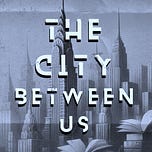Cole stood near a bullet-scarred kitchen window, preparing to livestream. Behind him, Tristan dabbed bronzer along his jaw like a battlefield stylist dressing a man for martyrdom.
“You need more contour, Cole,” Tristan said. “You look like a haunted bagel.”
Cole clutched his phone like a grenade of truth, rehearsing lines in his head.
“You know,” Tristan said, dipping a finger into concealer, “this isn’t the first time my people have battled on these streets. Let me tell you, before we were a ‘demographic,’ before Rainbow Capitalism turned our pain into a pride playlist—we dialed up some serious resistance. Stonewall was no party from what I hear.”
“So if someone dares judge me,” Tristan whispered, dotting Cole’s under-eye with something faintly shimmering, “I tell them being under siege is in my cultural DNA.”
Tristan gave Cole a pat of confidence. Cole cleared his throat, lifted the phone, and hit record.
“Once a quiet tree-lined street tucked away in the West Village—where rents were historically inaccessible and squirrels wore artisanal indifference—has now become its own little war zone, spawning a conflict between blood brothers and landlords.”
Tristan made a slight gesture: good, keep going.
Cole adjusted his tone. “And what of the inhabitants of this humble pre-war, current-war brownstone? How have they adapted, resisted, survived?”
It had been more than a week since the siege began.
In that time, the apartment had become something between a commune, a bunker, and a theatrical residency for the emotionally overqualified. What once was sharp tension—lawsuits, microaggressions, pillowcase gags—had mellowed into a strange, intimate choreography of survival.
The bedroom now housed a tiered bunk bed system, custom-rigged from salvaged IKEA remnants and one ill-gotten chaise lounge. Darcy and Cole had claimed the top bunk—primarily for strategic advantage, partially for spite. Juan and Tristan took the bottom—saying it was for “accessibility,” but really for proximity to the wine crate they used as a nightstand-slash-weapons cache.
The living room was common ground. A war room by morning, a café by brunch, a low-budget speakeasy by candlelight. Their routines were synchronized now: shifts on the fire escape, meal rotation, water rationing, psychic check-ins, and exactly one communal meltdown per day, to be performed dramatically and with appropriate lighting.
No one apologized anymore. They simply adapted.
The four had also enacted what Tristan called a “wartime celibacy statute " to conserve energy and maintain spiritual alignment under siege conditions. The reasoning was half-mystical, half-logistical: arousal scattered the chi, blurred the focus, and made the hallway patrols sloppy.
"Desire is a peacetime luxury," Darcy had declared, arms crossed, eyes red from incense exposure. No one argued.
Not even Juan, who had once seduced a Whole Foods cashier using only eye contact and a pomegranate.
Now, they sublimated. They journaled. They did planks.
AOC barked anytime someone lingered too long near another’s bunk, a tiny moral enforcer in faux fur. The system worked—sort of. They were tense, yes, but profoundly alert. Monastic. Sexy in theory. Miserable in practice. Focused.
They had, through smoke and absurdity, become a unit.
Not friends exactly. Not family.
Comrades.
“I found four cans of water chestnuts,” Darcy announced as she swung in from the fire escape, dropped her gear, and peeled off her gloves. “They’re in the ration pile.”
Juan had already begun plating brunch. “Brunch is served,” he called. “Today’s theme is scarcity chic.”
On the table: one soft avocado in mid-breakdown, thirty lentils per person, a tablespoon of almond paste spread lovingly across a cedar shingle, and half a can of peaches still tinged with debris.
“Anything gluten in this hellscape?” Darcy said, breathless.
“We have a stale baguette,” Tristan said. “But Juan has declared it ‘holy.’”
“I licked it,” Juan offered, deadpan.
Darcy waved it off. “I’ve had worse at Coachella.”
“I lived on ant larvae in the Andes for a week once,” Juan quipped. “More protein than beef. And honey, I’ve had my share of beef.”
Tristan snapped a photo of the table. “I’m calling this ‘Occupation Elegance.’ It’s going in the zine.”
Cole sat, still buzzed from his own narration. “If this is the end of civilization, at least we’re seated.”
Darcy turned to Cole. “Update on the outside world?”
He gestured to his phone. “Three thousand views. One hate comment. It said, ‘This is war porn for liberals.’”
Juan raised his glass of fermented nettle tonic. “To War Porn for Liberals!”
“To the West Village,” Darcy added.
Tristan sat down, adjusting a scarf. “Is it weird I’m…happy?”
Darcy scooped lentils with a bent spoon. “It’s not weird. We’re not just defending our apartment—we’re becoming it. I am this square footage now.”
Juan raised his glass again and looked across the table at Darcy and Cole with something bordering on reverence. “To Darcy and Cole. In the short time we’ve known you,” he began, “we’ve misjudged you.”
Tristan nodded solemnly, dramatically. “We thought you were textbook Connecticut. Possibly voted third-party on purpose.”
Juan went on. “We ‘kink-shamed’ you out of our insecurities. And for that, we apologize.”
Tristan added, “Who are we to judge another person’s ’throuple’ fantasy? We’re all sexual beasts in the end!”
“It’s… honestly very queer,” Juan said. “And that’s what unnerves us most.”
Darcy blinked. “Are we being honored or condemned?”
Another explosion shook the glass. AOC scurried under the table, dragging an unexploded tear gas canister she’d claimed as her toy. But no one else flinched.
Cole whispered softly to his phone: “Day twelve. The kink-shaming has subsided, morale is high, and we’ve begun mistaking survival for aesthetics. Which means... we’re thriving.”
Then they heard a slow, deliberate knock.
Three taps. A pause. Then, two more.
Everyone froze.
Darcy crept to the door and pressed her ear against the frame. “Who goes there?”
A pause.
“After everything I’ve done for you.”
They exhaled in unison.
Darcy unlatched the door and pulled it open like a velvet curtain.
Omar stepped in through the doorway, set down his bag like a conquering hero, and pulled out a single bottle of vintage champagne—“liberated,” he explained, from the landlord’s basement stockpile.
They gasped. They applauded. Juan kissed the label. Tristan all but wept.
Darcy wiped down a coffee mug and offered it as a stand-in flute. Cole reached for the wine key with the solemnity of a field medic.
Omar unscrewed the cage and popped the cork with one practiced twist, the sound like a celebratory gunshot—only gentler.
He poured slowly, reverently, leaned back against the cracked refrigerator and said, “I have news from the front. There was a skirmish on the first floor.”
Everyone went still. Even AOC sat down.
“Unit 1M. Madame Altalina.”
Tristan clutched his chest. “Oh my God! The Mezzo-Soprano on the first floor?”
Omar nodded, eyes gleaming. “Yes. The Landlord’s men tried to seize her grand piano. Said it was a luxury amenity outside her lease terms. She refused to surrender it.”
Darcy’s mouth fell open. “How did she fight them off?”
“She sang,” Omar said simply. “A Puccini aria so precise it shattered three light bulbs and caused one of the interns to question his sexuality.”
Tristan burst into applause. “That woman is a national treasure.”
Juan raised his glass. “To Altalina.”
They drank.
And for a moment, it felt like they had won.
Omar let the silence linger. Then, quietly, he said: “I’ve discussed a truce with my cousin, the landlord. We both agree too much blood has been spilled!”
Everyone turned. Champagne paused mid-air.
“But there are conditions,” Omar added. “He’s going co-op.”
All four moaned. The sound was somewhere between grief and lactose intolerance.
Juan dropped his spoon. “There must be a trust fund baby among us. That’s the only way this makes sense.”
“Is that what this war was all about?” Darcy asked, almost laughing. “A co-op board application? With headshots?”
Cole sank into his chair. “The last rent-controlled building in the Village, devoured by equity shares and brunch vouchers.”
Tristan clutched his scarf like a widow. “I knew something was off when I smelled almond flour in the hallway. The bourgeois always come in with nut-based things.”
“Or we can keep fighting,” Omar said.
Cole asked suddenly. “We can keep fighting? For this tiny, overpriced rectangle of hardwood and trauma?”
Cole glanced toward the wall, chipped from a shell blast but still retaining its original detail. He looked at the blinking red light on his phone, still recording.
"The war may be ending. And I think we’re all a little terrified that peace... means figuring out who we are without the conflict."
Omar smiled—softly but with the sadness of a man who’s seen both leases and legacies shredded.
“You ask who we are without the conflict,” he said. “Maybe the answer can be found in—who are we in conflict?”
Omar opened his palms like he was presenting invisible receipts.
He looked around the table, not accusing—just observant.
“In conflict, you are whatever the room requires. The fierce one. The broken one. The symbol. The joke. The threat.”
AOC barked once—as if confirming the thesis.
Outside, the night was silent. The wind whispered past the fire escape like a neighbor too tired to knock.
Inside, the champagne fizzed and fizzled.
They didn’t speak. They didn’t need to. The war might be over. But they had their square footage. Their routines. Each other.
And in New York, that’s more peace than most ever get.
Cole’s voice cut the silence.
“Has anyone here actually seen the landlord?” he asked slowly. “I mean, in person. With Omar. In the same room.”
Everyone turned.
Juan blinked. “Oh my God!”
Cole pressed on. “Think about it. Omar disappears, and the landlord attacks. Omar appears again, champagne in tow—now the war’s over.”
“It all makes sense, Cole! When Tristan asked Omar if the Israeli landlord was attacking us, he said, ‘Technically, I’m more Israeli than he is!’”
Tristan gasped. ”This is like Andrew Lloyd Webber produced a one-man Phantom of the Opera! But instead of a mask, it’s a co-op board! You may be sexy as fuck, Omar, but you’re nothing but a charlatan.”
Omar didn’t flinch. He merely adjusted his scarf, then said, with great calm: “They say the same thing about the landlord.”
That gave them pause.
“They think I’m the illusion. That there is no realtor. Just a landlord with good taste and an overactive imagination.”
Darcy narrowed her eyes. “So what are you saying?”
“I’m saying,” Omar said, standing, “it’s convenient for you to eliminate one of us! It’s convenient to declare one side fake. If you erase the agent, you erase the betrayal. If you erase the landlord, you erase the power. Either way, you deny there’s even a victim. Or a villain. You make the whole war abstract.”
Omar walked to the window again, staring out through the fractured glass.
“You know the real tragedy?” he said. “Once you pick your side, you have to live there. Even after the fighting stops, my cousin and I … will never change. He calls me the squatter, I call him the occupier, but the truth is, we both have keys. War casts us in these roles, and once you’ve been cast, no one remembers it was a family story. Peace?” He shrugged. “Peace would mean stepping out of character. And neither of us knows how to do that anymore.”
Cole studied him, uncertain now if he was staring at a man, a myth, or the most successful housing scam in lower Manhattan.
But Omar simply turned and smiled, that same vague, radiant ambiguity.
“I just want you to be happy,” he said. “After everything I’ve done for you.”
Omar looked at each of them, his face glowing with the quiet dignity of a man who’d duct-taped a dream together more than once.
Juan translated, “My New Yorican Grandfather used to say: If you’re going to screw me, at least kiss me first. I’d say Omar accomplished that.”
Omar smiled faintly. “You’re welcome.” And just like that, he stepped away and vanished into the hallway.
No one spoke for a moment.
They stood there, glasses in hand, watching the empty doorway like it might speak again.
Then Tristan raised his glass.
“To the co-op.”
Juan clinked his. “To the absurdity of shared ownership.”
Darcy nodded. “To whatever this is now.”
Cole looked around the apartment—the scorch marks, the bunk beds, the tiny war they’d made a home in—and said softly, “To enduring.”
And they drank quietly—roommates now and something that could only happen in Greenwich Village and only during peacetime negotiated with palo santo and passive aggression, Darcy and Cole, Tristan and Juan came to cohabitate in the tiniest of apartments—four souls, and square footage so small it required synchronized breathing.
It wasn’t a throuple. It transcended throupledom. It was something stranger, sturdier, beautifully ill-defined.
Eventually, they bought the place—through a complex arrangement involving ghost LLCs and a failed tech angel in Tel Aviv—and decorated it together: brutalist shelving, bisexual lighting, and a wet bar shaped like a question mark.
AOC remained neutral, loyal only to the scent of power and the rustle of unattended food wrappers. She had switched alliances more times than anyone cared to count. Ultimately, she came down firmly on the side of whoever dropped the most crumbs. And in the new co-op structure, she appointed herself Treasurer.
No one contested it.
So, they lived quite happily ever after. Or close enough. Which, in New York, is ever after.
© Michael Arturo, 2025
_
Buy Me A Coffee
Support by hitting the like button or leaving a comment.
Michael Arturo writes fiction, contemporary political/social commentary, parodies, parables, satire. Michael was born and raised in New York City and has a background in theater and film. His plays have been staged in New York, London, Boston, and Los Angeles.















Share this post